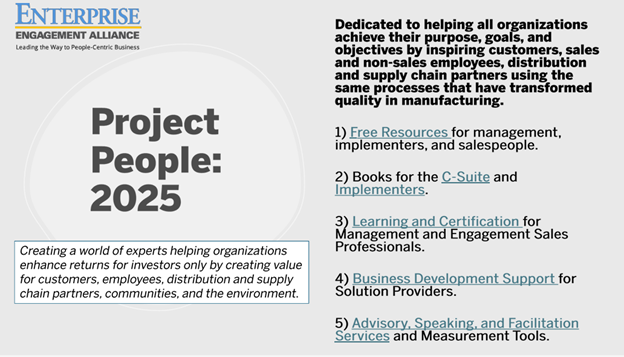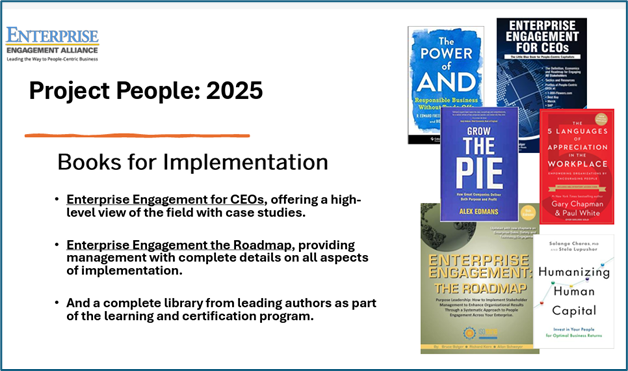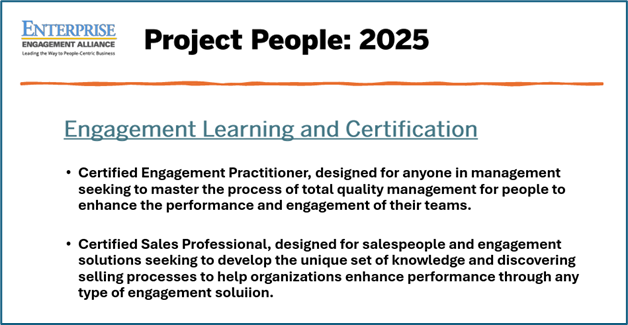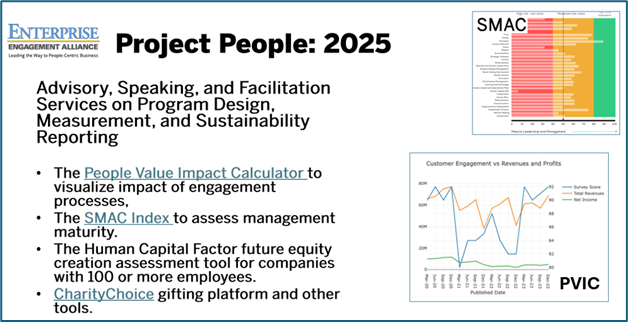Why the EEA Was Founded in 2009: To Help All Organizations Profit From the Golden Rule in Business
Why the EEA
Applying a Systematic Approach to Valuation Creation Through People
An Emphasis on Practical Implementation and Impact Measurement
Click here to subscribe to the ESM weekly e-newsletter.
Harmonize the interests of your shareholders, employees, distribution and supply chain partners, and communities on your organizational based on the principles of the Golden
 Rule, and you and your organization will have a competitive advantage over those that don’t. That’s why the Enterprise Engagement Alliance was founded.
Rule, and you and your organization will have a competitive advantage over those that don’t. That’s why the Enterprise Engagement Alliance was founded.Click here or on the Project People 2025 slide for a more visual overview of our purpose, goals, objectives, values, and activities.
With stakeholder engagement at record lows in the US and in many other countries, more proof of the connection between engagement and performance, and the availability of an implementation framework proven in manufacturing, the EEA remains focused on informing the public of the economic benefits, case studies, the implementation framework and most importantly the impact of stakeholder engagement practices.
Conceived in 2008 based on over 10 years of research conducted by a forum at Northwestern University on the connection between employee and customer engagement and financial results, along with other research, the Enterprise Engagement Alliance is a secular, non-partisan business education organization officially founded Jan. 1, 2009.
The principles of stakeholder capitalism or enterprise engagement are not a movement and are nothing new. They are simply the application to people of the same strategic, systematic and holistic approach to enhancing quality in manufacturing. Stakeholder capitalism helps foster prosperity because organizations focus on enhancing returns for investors only by creating value for customers, employees, distribution partners, communities, and the environment. They don’t offload their costs on to society by underpaying employees, misleading customers, squeezing distribution and supply chain partners, or on to society by abandoning infrastructure or polluting the environment.
Why the EEA
Our creation was based on these startling realities that have essentially remained unchanged over decades despite enormous advances in technology and
 extensive research on motivation.
extensive research on motivation.
- What is being done to engage people isn’t working. By every measure, customer and employee satisfaction remain low, despite the fact that most organizations spend more than 50% of cash flow every year on employee and customer expenses.
- CEOs are driving with one eye on the road. A majority of organizations continue to overlook the extensive research and experiential evidence proving the competitive advantages of having the interests of all stakeholders focused on the organization’s purpose, goals, and objectives.
- There is no clear leadership paradigm. Despite the availability of world-class customer coaching, there remains a fundamental struggle to find today’s leadership paradigm: Is it based on prioritizing the interests of shareholders or harmonizing the interests of all stakeholders to support the purpose, goals, objectives and values of the organizations?
- Huge waste and misery come from historically low employee engagement. Gallup estimates that companies worldwide waste over $7 trillion in lost productivity due to employee engagement nearing record lows. Over two-thirds of people dread Monday, according to a survey called the Integral Index.
- Customer service is generally “meh,” leading to daily frustrations. US citizens give customer service at best a “C” grade, according to the American Customer Satisfaction Index.
- Serious casualties occur every year. Over 200,000 deaths occur each year due to medical errors. Imagine the cost of errors not tracked in other fields. About 5,500 people die on the job each year in the US, according to the Bureau of Labor Statistics, not to mention the nearly 1 million accidents resulting in days off and an estimated $175 billion in trackable costs.
-
Companies bury enormous waste. Accounting and financial disclosure practices hopelessly fail to shed light on the 80% to 90% of an
 organization’s opportunities and risks lumped under the balance sheet category of goodwill. Without effective measures in employee and customer management, the average company buries waste into their bottom lines to an extent that was prevalent in manufacturing in the days before total quality management, which can be more easily measured.
organization’s opportunities and risks lumped under the balance sheet category of goodwill. Without effective measures in employee and customer management, the average company buries waste into their bottom lines to an extent that was prevalent in manufacturing in the days before total quality management, which can be more easily measured. - Marketing remains broken. According to Statista, a 2021 survey finds that about 46% of Americans say they find TV, radio, and print ads to be somewhat or very trustworthy. Most marketing efforts remain more focused on measuring pipelines and activities than actual impact.
- Unsustainable income disparity continues to grow. Almost two-thirds of US wealth is owned by 10% of earners, according to Statista, leading to what appears to a growing level of citizen dissatisfaction. In the EU, this same source says that 10% of earners own about one third of EU wealth. Meanwhile most Europeans enjoy at least five weeks of vacation, low-cost education and health care, and a transportation infrastructure that puts ours to shame.
- There remains no cohesive movement for reform. While over a dozen organizations around the world are working to enhance capitalism, they show few signs of serious cooperation and there is no other media but ours currently covering their activities. Some seek to “own” a share of the market through copyrighting processes, but like total quality management or the Golden Rule, the process cannot be owned by anyone.
Applying a Systematic Approach to Valuation Creation Through People
The EEA was founded to do for people management what took the total management movement decades to accomplish in manufacturing: create better outcomes and experiences by engaging all stakeholders in the mission to build total quality management and continuous improvement into the factory floor culture. This in turn helps society by fostering the creation of good jobs, customer experiences, successful distribution and supply chain partners, and healthy communities.
The concepts of business management and total quality management developed by Peter Drucker and W. Edwards Deming in the 1940s and 1950s worked wonders to help transform the brand of Japanese manufacturing from junk in the 1950s to best in class today. These same principles, rooted in a fundamental commitment to harmonizing the interests of all stakeholders—customers, employees, distribution and supply chain partners, and communities—not only create conditions favorable to sustainable success but also help society.
How? Organizations focused on value creation have a business operating system that makes sure their employees are paid a living wage and more with
.png) safe working conditions. They focus their employees on everything that can be done to create value for and to serve external and internal customers, which in turn creates better customer experiences. They build successful distribution and supply chain partners that in turn create opportunities for other businesses, and their focus on supporting the communities in which they operate create a virtuous circle.
safe working conditions. They focus their employees on everything that can be done to create value for and to serve external and internal customers, which in turn creates better customer experiences. They build successful distribution and supply chain partners that in turn create opportunities for other businesses, and their focus on supporting the communities in which they operate create a virtuous circle.The EEA was founded by about 10 years of research conducted by the Forum for People Performance Management, co-founded by Bruce Bolger, finding a clear link between customer and employee engagement and financial results.
The purpose was and is to promote an open-source approach to performance improvement through people that can be implemented by almost any organization with minimal upfront investment and no additional costs over time.
An Emphasis on Practical Implementation and Impact Measurement
Our purpose, goals, and objectives are to do for people management what total quality management when properly implemented has accomplished in manufacturing. Unless officially founded as a benefits corporation to put the mission of solving a social issue above those of shareholders, an organization’s only social responsibility is to fulfill its purpose based on the principles of the Golden Rule rather than shareholders alone.
EEA services include:
Information and Learning

- Information. Benefit from free news, research, and trends on the implementation of stakeholder engagement practices covered in our weekly ESM media and regularly updated library and YouTube channel and RRN media, covering total rewards and regularly updated library. Click here for an ESM media kit. Click here for an RRN media kit.
- Outreach. The Golden Rule Alliance outreach effort to education the business world and public on the meaning of stakeholder capitalism and its application to business and life.
- Advocacy. Profit from the principles of purpose-based, stakeholder engagement by joining the Enterprise Engagement Alliance Academy for complete support services and community, offering six books and nine videos on all aspects of stakeholder management, metrics, reporting, and optional certification.
- Learning. Master stakeholder engagement processes and/or sales through two training and certifications that come with but do not require EEA membership.
- Enterprise Engagement for CEOs. The only how-to book specifically designed for CEOs, boards, and investors seeking a quick introduction the implementation of stakeholder engagement to harmonize the interests of all stakeholders toward a common purpose.
- Enterprise Engagement: The Roadmap. A detailed implementation textbook for management in sales, marketing, human resources, administration, or anyone who manages a team. It provides a detailed implementation roadmap as well as information on how to integrate all the tools of engagement to achieve your organization’s purpose, goals, and objectives.
- Instant self-evaluation. Assess the maturity and alignment of an organization’s stakeholder engagement practices. Fill out this free 10-minute confidential Stakeholder Management Assessment Calculator and access a low-cost version to conduct a thorough analysis of any size or type of organization to identify risks and opportunities.
- Impact assessment. Measure the impact of purpose and people management with the EEA People Value Impact Calculator software to track the impact of people investments in human resources, marketing, distribution and supply chain management, communities, and more, available as an EEA member benefit.
- Charitable contributions. Promote meaningful charitable contributions with a free CharityChoice co-branded web site for your organization to support charitable giving by employees, customers and other stakeholders only to charities your organization chooses that help address the health, welfare, and safety of people.
- Take advantage of business development services in the marketing and human capital management using permission-based social, email, and video content marketing designed for solution providers seeking to help organizations enhance performance through people.
- Research on engagement impacts and ROI in your organization, including stakeholder alignment surveys, meta-analyses of other research, and white papers.
- Corporate Sustainability reporting advisory services for all types of organizations and solution providers seeking to benefit from a more sustainable path to value creation and to publish meaningful corporate sustainability reports.
Bruce Bolger
914-591-7600, ext. 230
Bolger@TheEEA.org
Enterprise Engagement Alliance Services
 Celebrating our 16th year, the Enterprise Engagement Alliance helps organizations enhance performance through:
Celebrating our 16th year, the Enterprise Engagement Alliance helps organizations enhance performance through:1. Information and marketing opportunities on stakeholder management and total rewards:
- ESM Weekly on stakeholder management since 2009. Click here to subscribe; click here for media kit.
- RRN Weekly on total rewards since 1996. Click here to subscribe; click here for media kit.
- EEA YouTube channel on enterprise engagement, human capital, and total rewards since 2020
 Management Academy to enhance future equity value for your organization.
Management Academy to enhance future equity value for your organization.3. Books on implementation: Enterprise Engagement for CEOs and Enterprise Engagement: The Roadmap.
4. Advisory services and research: Strategic guidance, learning and certification on stakeholder management, measurement, metrics, and corporate sustainability reporting.
5. Permission-based targeted business development to identify and build relationships with the people most likely to buy.
Contact: Bruce Bolger at TheICEE.org; 914-591-7600, ext. 230.














